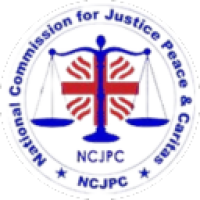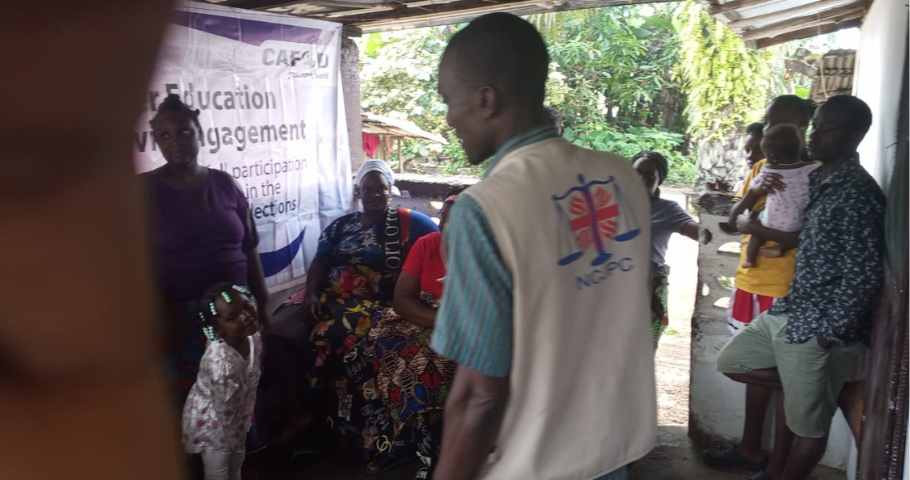“”Faith-based organizations like NCJPC are pivotal in weaving the fabric of social justice throughout Liberia, embodying the principle that true peace and progress stem from a society rooted in justice, compassion, and equality for all”
Liberia, a country marked by its rich history and vibrant culture, faces ongoing challenges in achieving peace, equity, and social justice. Within this context, faith-based organizations (FBOs) emerge as critical support pillars, bridging the divide between governmental efforts and the grassroots needs of communities.
The National Commission for Justice, Peace, and Caritas (NCJPC), founded under the auspices of the Catholic Bishops’ Conference of Liberia (CABICOL), distinguishes itself among these organizations.
Its commitment to fostering social justice through a comprehensive approach that includes legal aid, advocacy, and environmental sustainability positions it as a beacon of hope for many.
This section will set the stage for understanding the indispensable role FBOs like NCJPC play in weaving the social fabric of Liberia toward a more equitable and peaceful future.
Historical Context
The involvement of faith-based organizations in Liberia’s social and political landscape has yet to be recent. Historically, these organizations have been at the forefront of humanitarian efforts, especially during civil unrest and conflict.
They have served as providers of essential services, mediators, and advocates for peace and reconciliation. This deep-rooted history of active engagement has set the foundation for contemporary entities like the National Commission for Justice, Peace, and Caritas (NCJPC).
Established in 2017 by the Catholic Bishops’ Conference of Liberia (CABICOL), the NCJPC was born out of a necessity to address the complex challenges facing Liberia in the aftermath of its civil wars. These challenges included widespread poverty, a fragile peace, and the urgent need for reconciliation among communities torn apart by conflict.
The Catholic Church, recognizing its unique position within the Liberian society, sought to leverage its influence and network to spearhead initiatives aimed at healing, development, and justice.
The NCJPC’s formation marked a significant milestone in Liberia’s Church’s commitment to social justice. It signified a unified effort to address the immediate needs arising from the country’s historical conflicts and tackle ongoing issues through a gospel-centered approach to justice and peace.
This section highlights the continuity of faith-based intervention in Liberia, illustrating the enduring legacy of organizations like NCJPC in the nation’s journey toward recovery and stability.
Core Missions and Strategies
At the heart of the National Commission for Justice, Peace, and Caritas (NCJPC) lies a mission deeply embedded in the teachings and gospel of Jesus Christ. This mission drives the organization to address not just the physical and emotional needs of Liberians but their spiritual well-being, too.
NCJPC’s approach is multifaceted, targeting various aspects of social justice through legal aid, advocacy for the rule of law, environmental sustainability, and promoting peace via interfaith dialogue. Each of these strategies is tailored to meet the unique challenges faced by communities across Liberia.
Legal Aid and Advocacy: NCJPC is committed to ensuring that justice is accessible to all, especially the marginalized and disadvantaged. They empower individuals and communities to navigate the complex legal system by providing legal support and representation. Advocacy efforts are focused on promoting the rule of law, emphasizing human rights and the protection of the vulnerable.
Environmental Sustainability: Recognizing the intrinsic link between ecological stewardship and social justice, NCJPC engages in initiatives to promote the sustainable use of resources. This includes education campaigns on the importance of environmental conservation and projects that encourage adopting sustainable practices.
Promoting Peace through Interfaith Dialogue: NCJPC fosters an environment of mutual understanding and respect among faith communities in a country marked by its diversity. They aim to build bridges and heal divisions through dialogue and collaborative projects, laying the groundwork for lasting peace.
This comprehensive strategy underscores NCJPC’s holistic approach to social justice, reflecting a deep understanding of the interconnectedness of physical, emotional, and spiritual needs in the quest for a just and equitable society.
Case Studies
The impact of the National Commission for Justice, Peace, and Caritas (NCJPC) is most vividly seen through its tangible interventions across Liberia. These case studies exemplify the organization’s dedication to its mission, showcasing how legal aid, environmental sustainability, and peace initiatives have transformed lives and communities.
Legal Aid for the Marginalized: One poignant example involves a young woman from a rural Liberian community who was wrongfully accused of a crime she did not commit. With no financial resources for legal representation, her prospects appeared grim. NCJPC intervened, providing her with a lawyer who not only secured her release but also worked to ensure that she received compensation for the wrongful accusation. This case highlights NCJPC’s critical role in ensuring justice for those who cannot afford it.
Environmental Advocacy in Action: In another instance, NCJPC launched a community-based reforestation project in an area heavily affected by deforestation. By involving local schools and community leaders, they planted thousands of trees and educated the community on the importance of environmental protection. This initiative contributed to the local ecosystem’s health and fostered a sense of ownership and responsibility towards the environment among the participants.
Promoting Peace through Dialogue: A remarkable success story of NCJPC’s peace initiatives is their role in mediating a long-standing dispute between two communities divided by religious differences. Through months of careful dialogue and negotiation, NCJPC facilitated an agreement that led to a joint community project, symbolizing the newfound peace and cooperation. This interfaith collaboration resolved a conflict and built lasting bridges of understanding and mutual respect.
These case studies reflect the profound difference NCJPC’s programs make in the lives of individuals and communities. By addressing legal injustices, advocating for environmental sustainability, and fostering peace through dialogue, NCJPC exemplifies how faith-driven missions can lead to significant social change.
Challenges and Opportunities
While the National Commission for Justice, Peace, and Caritas (NCJPC) has made significant strides in promoting social justice across Liberia, it faces its share of challenges. Yet, within these challenges lie opportunities for growth and increased impact.
Challenges Facing NCJPC:
- Resource Constraints: One of the most pressing challenges is the limited resources available to support its programs. From funding legal aid services to environmental projects, resource constraints can limit the scope and reach of their initiatives.
- Complex Socio-Political Landscape: Navigating Liberia’s socio-political environment poses another challenge. Achieving lasting change often requires engaging with and influencing policy at various levels, which can be daunting given the complexities of local, regional, and national politics.
- Sustainability of Programs: Ensuring the sustainability of their initiatives beyond the initial implementation phase is crucial. This involves financial sustainability and building local capacity to continue the work independently.
Opportunities for Growth and Impact:
- Leveraging Technology: There is a growing opportunity to leverage technology to expand NCJPC’s reach and efficiency. Digital platforms can enhance legal aid services, environmental education, and interfaith dialogue, reaching a broader audience.
- Partnerships: Building partnerships with other organizations, both local and international, can amplify NCJPC’s impact. Collaborations can bring in additional resources, share expertise, and strengthen advocacy efforts.
- Community Engagement: Increasing community engagement in their programs offers a pathway to greater sustainability and impact. Empowering communities to take ownership of initiatives ensures their continuation and relevance.
Despite the challenges, the evolving role of faith-based organizations like NCJPC in social justice presents a hopeful future. With strategic approaches to overcoming obstacles and capitalizing on opportunities, NCJPC can enhance its contribution to building a just and peaceful Liberia.
Final thoughts
Faith-based organizations such as the National Commission for Justice, Peace, and Caritas (NCJPC) are indispensable pillars in Liberia’s ongoing pursuit of justice and peace.
Through their unwavering commitment to social justice, rooted in the gospel of Jesus Christ, they address the multifaceted needs of the Liberian people.
From providing critical legal aid to fostering environmental stewardship and promoting interfaith harmony, NCJPC embodies a holistic approach to societal transformation.
The challenges they face, while significant, are matched by the opportunities for growth and increased impact.
As they navigate the complexities of Liberia’s socio-political landscape and strive for the sustainability of their programs, the support of both the local and international community becomes crucial.
Through such support, organizations like NCJPC can continue to make a profound difference in the lives of many.
In a world that yearns for justice and peace, the mission of faith-driven entities like NCJPC serves as a beacon of hope. Supporting these organizations is not just an act of charity but an investment in the future—a future where justice, peace, and harmony prevail for all in Liberia.

